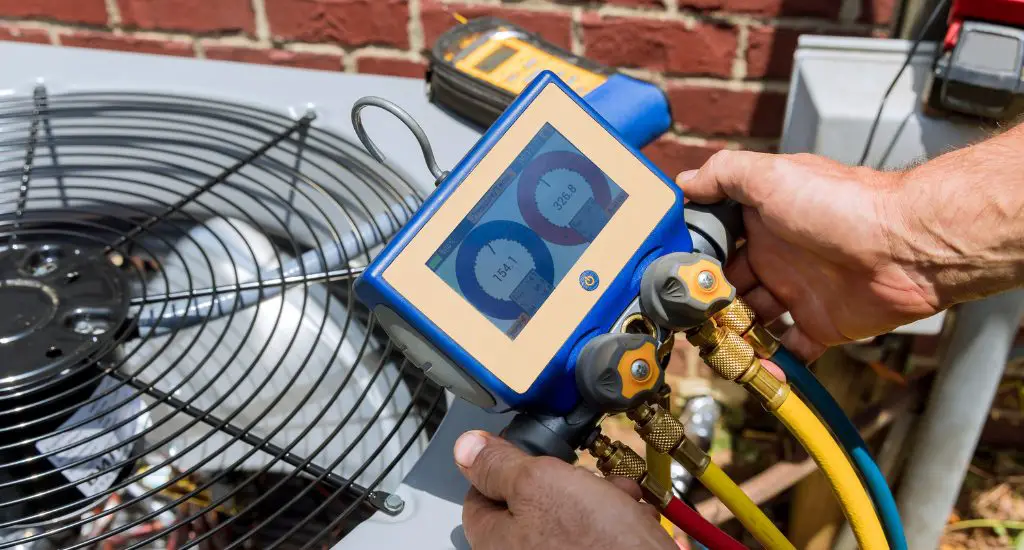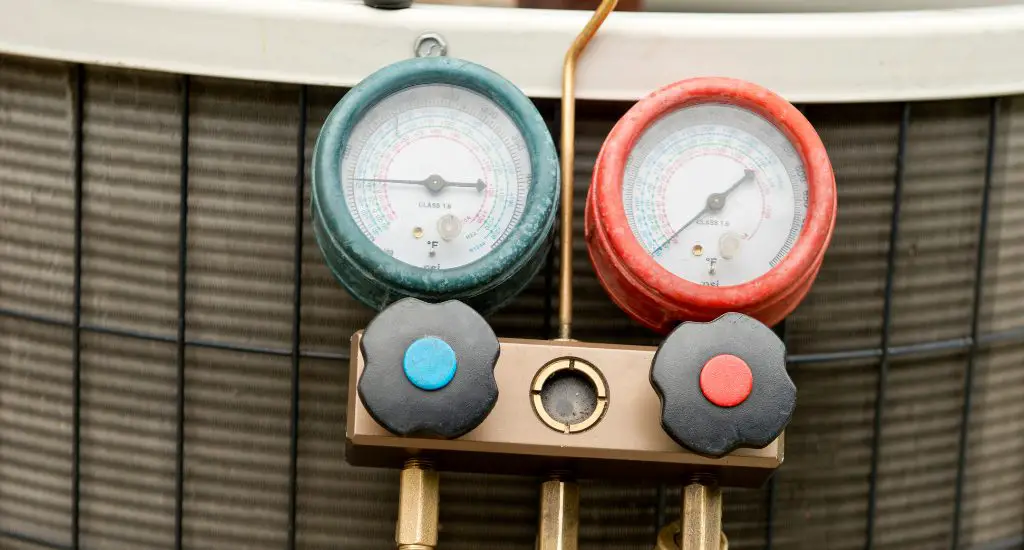As the summer months approach, it’s important to ensure that your air conditioning system is functioning at its optimal level. One of the most common issues that homeowners face with their AC units is refrigerant leaks.
Refrigerant leaks can have various negative impacts on your air conditioning system, including reduced cooling efficiency, increased energy consumption, and even health risks. In this article, we will delve into the common causes of refrigerant leaks in air conditioning systems, their effects, and prevention measures so you can steer yourself to safety and effective cooling.

What is Refrigerant?
Before we dive into the common causes of refrigerant leaks, let us first discuss what refrigerant is. Refrigerant is a fluid used in air conditioning systems to transfer heat from the indoor air to the outdoor air. The refrigerant absorbs heat from the indoor air, cools it down, and then releases the heat outside. This cycle is repeated continuously, resulting in the cooling of the indoor air.
Types of Refrigerants Commonly Used in AC Systems
There are several types of refrigerants commonly used in air conditioning systems. Some of the most common types include:
| R-22 | Also known as Freon, R-22 is a hydrochlorofluorocarbon (HCFC) refrigerant that has been widely used in air conditioning systems for many years. However, due to its negative environmental impact, its production and importation have been phased out. |
| R-410A | This is a hydrofluorocarbon (HFC) refrigerant that has replaced R-22 in new air conditioning systems. It is more environmentally friendly and has better cooling efficiency. |
| R-134a | This is a hydrofluorocarbon (HFC) refrigerant commonly used in automotive air conditioning systems. |
Common Causes of Refrigerant Leaks
Refrigerant leaks can occur for various reasons. Some of the most common causes include:
| Age of the AC Unit |
| As air conditioning units age, their components become more prone to wear and tear. The refrigerant lines and coils, in particular, can develop leaks over time, especially if they haven’t been properly maintained. |
| Wear and Tear |
| Even in newer air conditioning systems, wear and tear can occur due to regular use. The constant cycling of the refrigerant through the system can cause small cracks and leaks to develop in the refrigerant lines and coils. |
| Poor Installation |
| If your air conditioning system was not properly installed, it can cause refrigerant leaks. For example, if the refrigerant lines were not properly sealed or insulated, the refrigerant can leak out. |
| Corrosion |
| Corrosion can occur in the refrigerant lines and coils due to exposure to moisture and other environmental factors. When the metal corrodes, it can create holes and leaks in the refrigerant lines. |
| Vibration and Movement |
| Air conditioning units vibrate and move during operation, which can cause the refrigerant lines to rub against each other or other components. This rubbing can cause small cracks and leaks to develop over time. |
| Physical Damage |
| Physical damage to the air conditioning system, such as from hail or fallen branches, can cause refrigerant leaks. The impact can cause holes and cracks to develop in the refrigerant lines and coils. |
| Lack of Maintenance |
| Proper maintenance is essential for the longevity and efficiency of your air conditioning system. If your system is not regularly inspected and maintained, small refrigerant leaks can go undetected and worsen over time. |
| Overcharging or Undercharging of Refrigerant |
| If your air conditioning system has too much or too little refrigerant, it can cause leaks to develop. Overcharging can cause excess pressure to build up in the system, leading to leaks. Undercharging can cause the refrigerant lines to become too cold, which can cause them to crack and leak. |
Effects of Refrigerant Leaks in Air Conditioning Systems
Refrigerant leaks can have several negative impacts on your air conditioning system, including:
| Reduced Cooling Efficiency | Refrigerant is a crucial component in your air conditioning system, and when it leaks out, the system’s cooling capacity is reduced. This can cause your home to become less comfortable, especially on hot summer days. |
| Higher Energy Consumption | When your air conditioning system is low on refrigerant, it has to work harder to cool your home, which can cause your energy bills to increase. This can be especially noticeable if you’ve noticed a sudden spike in your energy bills. |
| Increased Repair and Replacement Costs | Refrigerant leaks can cause damage to other components in your air conditioning system, such as the compressor or condenser. This can result in costly repairs or even the need to replace the entire system. |
| Environmental Impact | Refrigerants have been found to contribute to global warming and ozone depletion. When refrigerant leaks occur, they release these harmful gases into the environment, contributing to these issues. |
| Health Risks | Refrigerants can be harmful if they are inhaled or come into contact with skin. If you suspect that you have a refrigerant leak in your home, it’s important to have it addressed immediately to avoid any potential health risks. |
Detection of Refrigerant Leaks
If you suspect that your air conditioning system has a refrigerant leak, there are several signs and symptoms to look out for, including:
✔ Reduced cooling capacity
✔ Hissing or bubbling noises coming from the air conditioning unit
✔ Ice buildup on the refrigerant lines or coils
✔ Higher than normal energy bills
✔ A strong, sweet odor (this is a sign of some refrigerants, such as R-22)
It’s important to note that refrigerant leaks can be difficult to detect without the proper tools and methods. This is why it is essential to have your air conditioning system regularly inspected and maintained by a professional.
Prevention of Refrigerant Leaks

The best way to prevent refrigerant leaks from occurring in your air conditioning system is to follow these preventative maintenance measures:
| Proper Installation | Make sure that your air conditioning system is properly installed by a professional. This will ensure that the refrigerant lines and coils are properly sealed and insulated, reducing the risk of leaks. |
| Regular Maintenance and Inspections | Schedule regular maintenance and inspections for your air conditioning system. This will help to identify any potential refrigerant leaks early on, before they have a chance to worsen. |
| Timely Repairs | If you do notice any signs of a refrigerant leak, have it addressed immediately. The longer you wait, the more damage it can cause to your system, resulting in costly repairs or even the need to replace the entire system. |
| Replacement of Old and Worn Out Parts | Over time, certain components in your air conditioning system will wear out and become more prone to leaks. If your system is older, consider having these components replaced to reduce the risk of leaks. |
| Proper Refrigerant Handling and Charging | When adding or replacing refrigerant in your air conditioning system, make sure that it is done properly by a professional. Overcharging or undercharging can cause leaks to develop. |
Stay Cool And Save Money By Preventing Refrigerant Leaks
Refrigerant leaks can have several negative impacts on your air conditioning system, your wallet, and the environment. By understanding the common causes of refrigerant leaks and following preventative measures, you can ensure that your air conditioning system is functioning at its optimal level. Don’t hesitate to contact a professional if you suspect that you have a refrigerant leak in your home. With proper maintenance and timely repairs, you can enjoy a cool and comfortable home all summer long.



